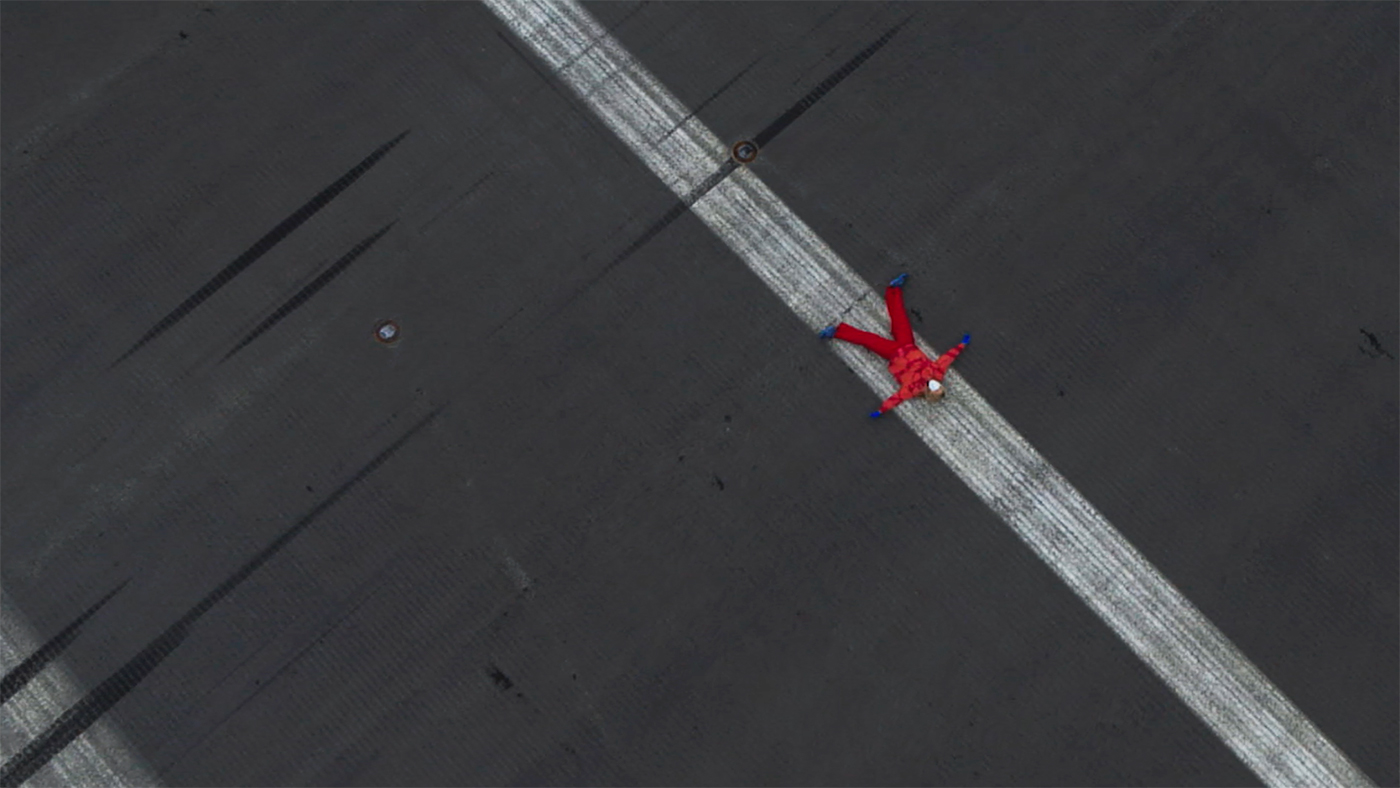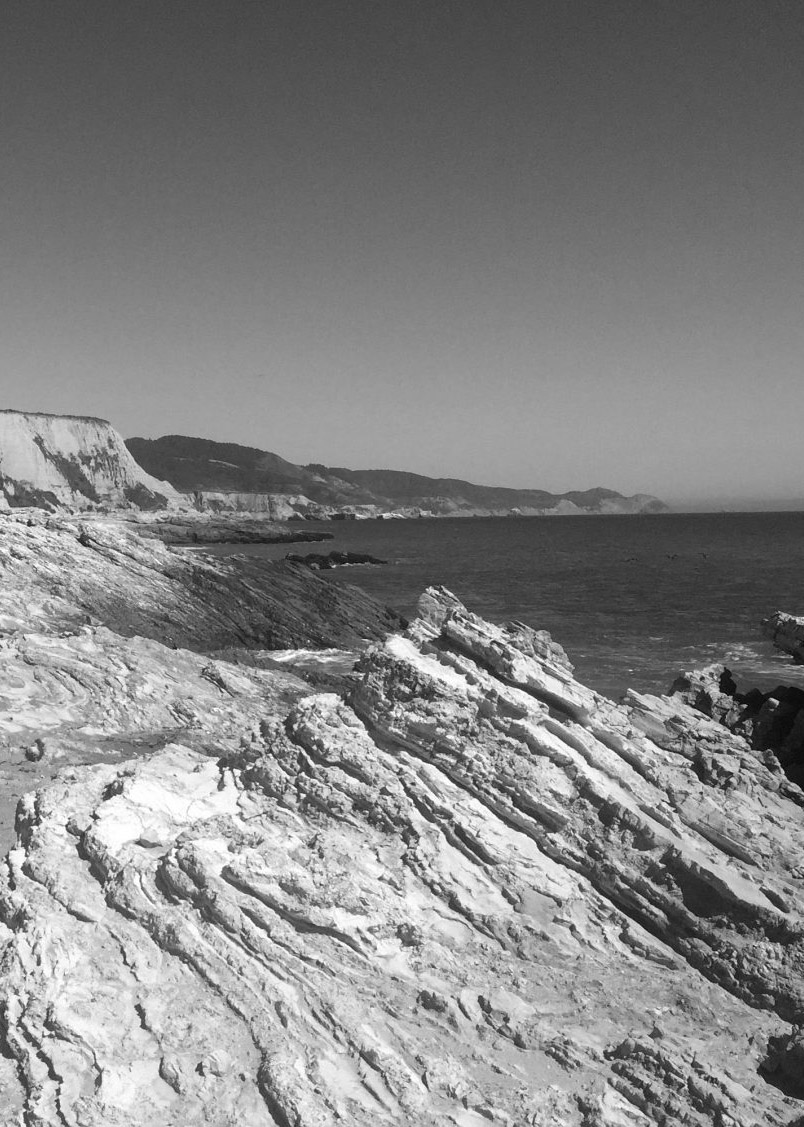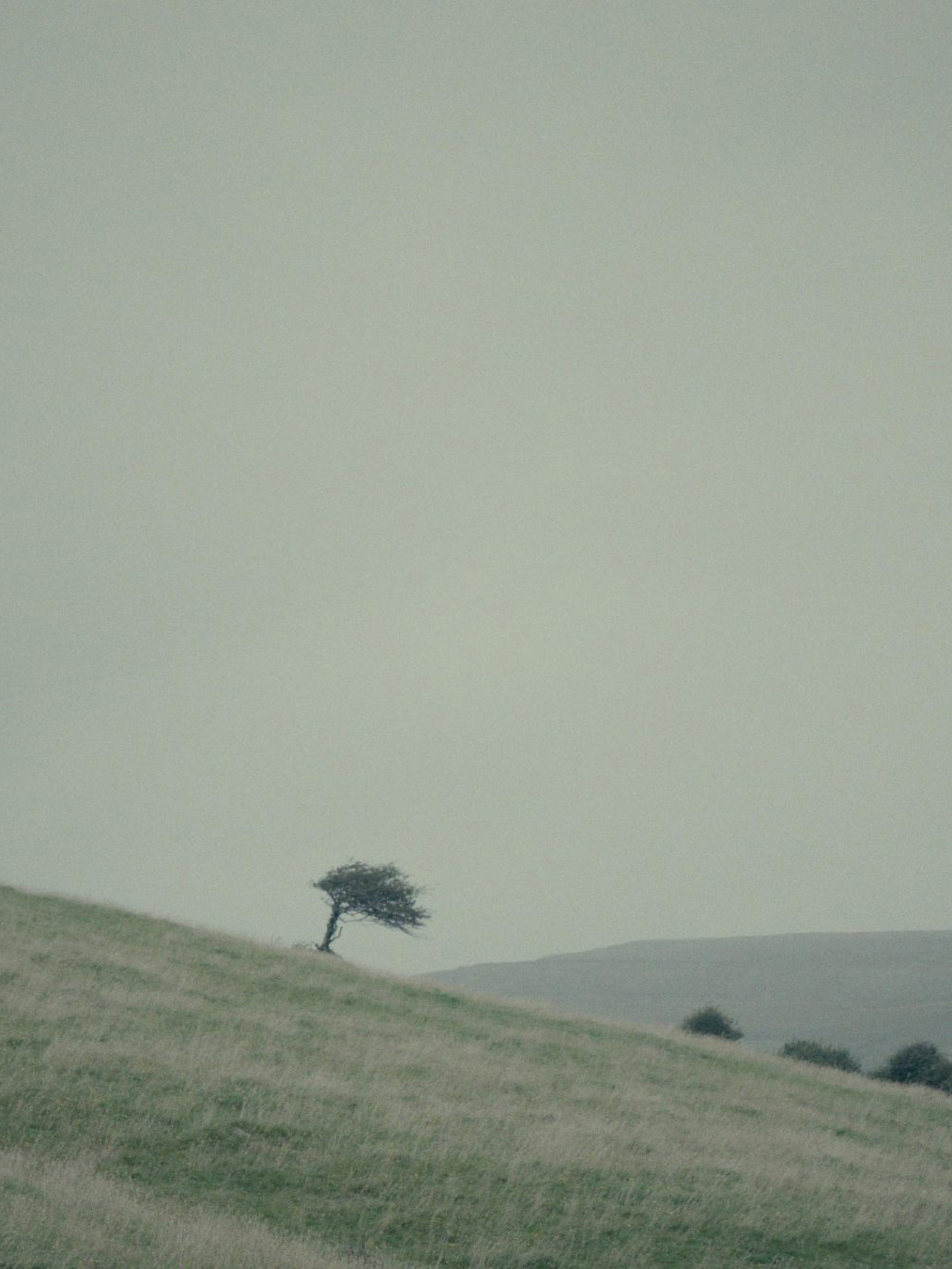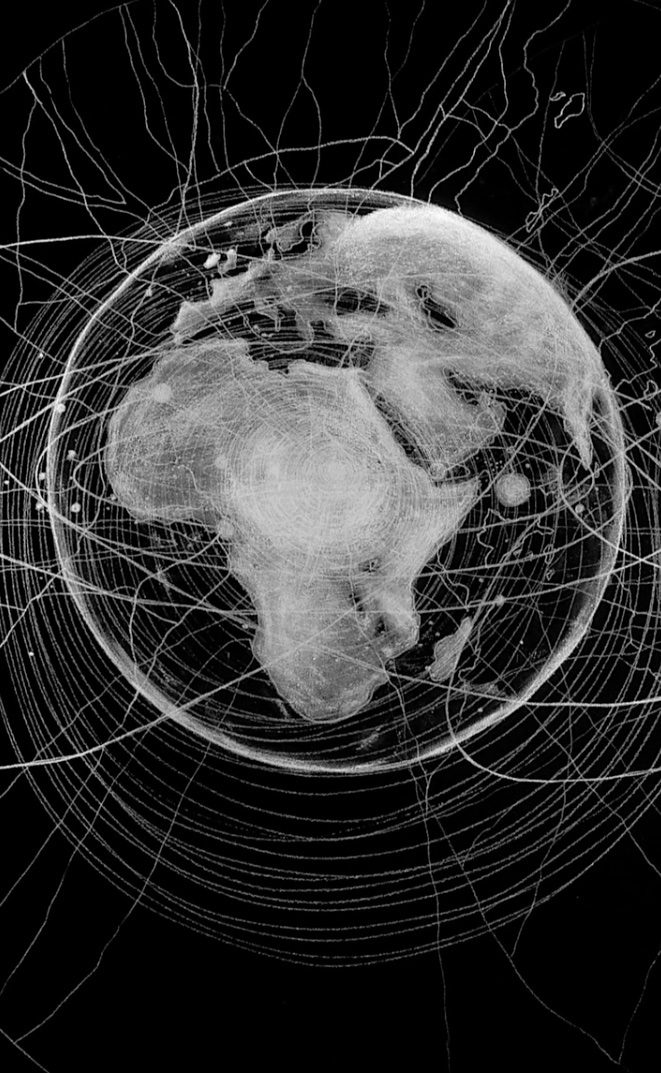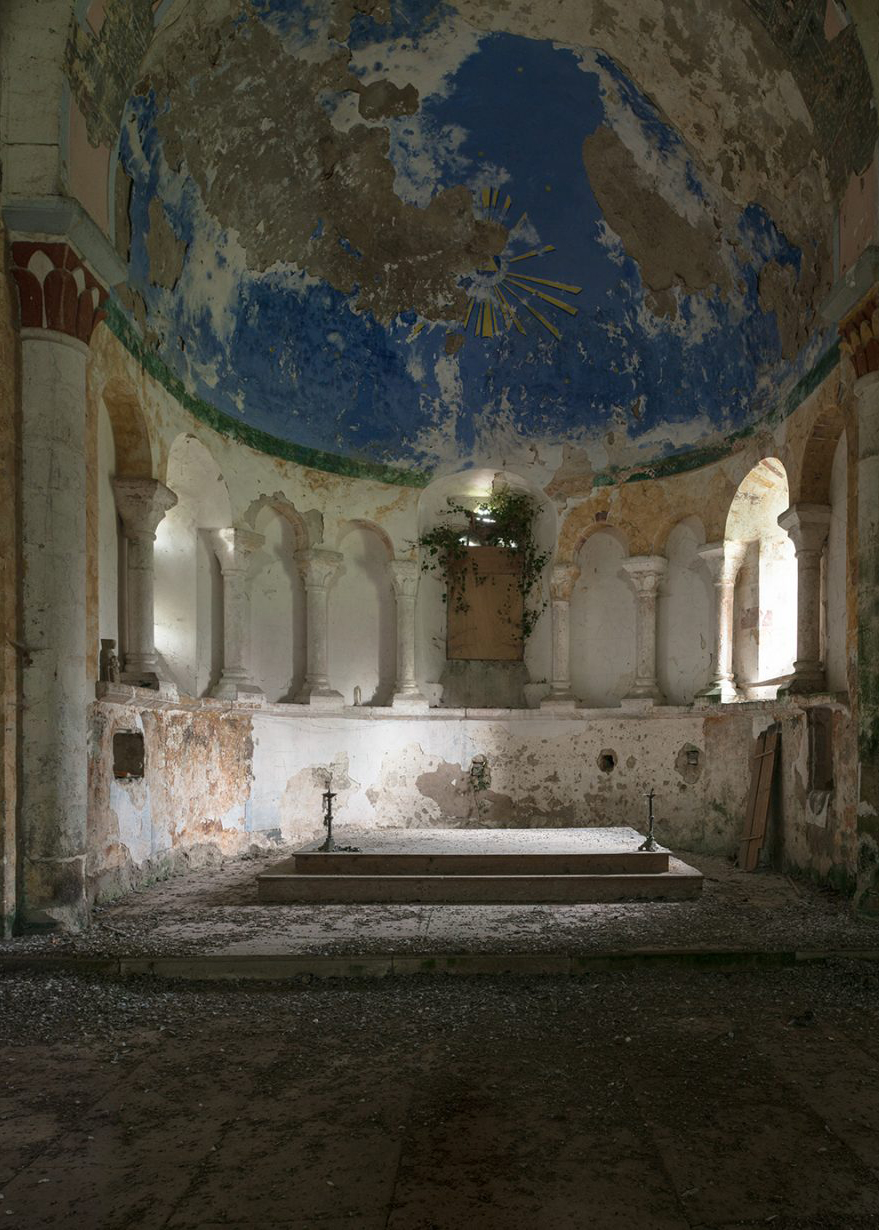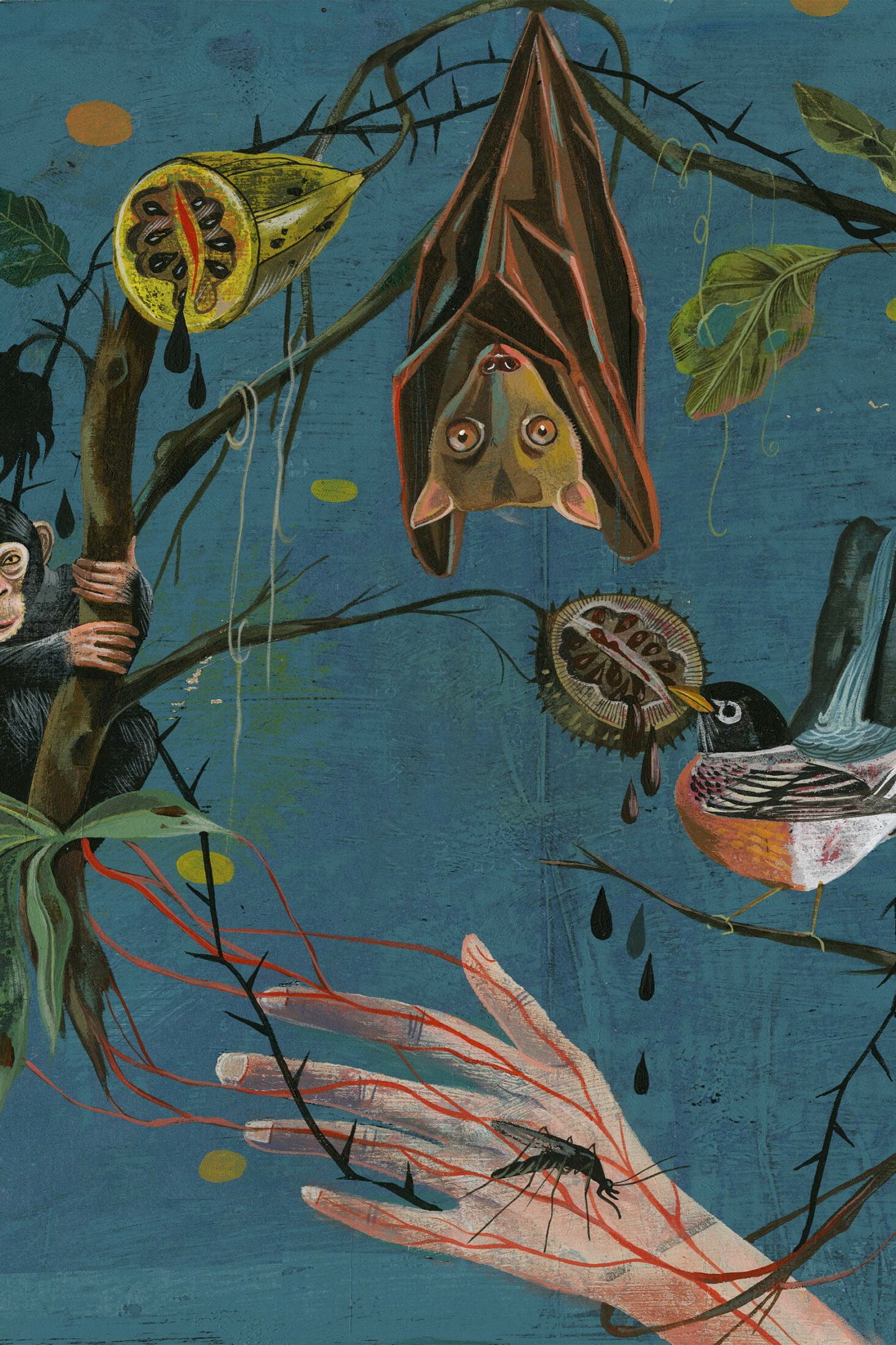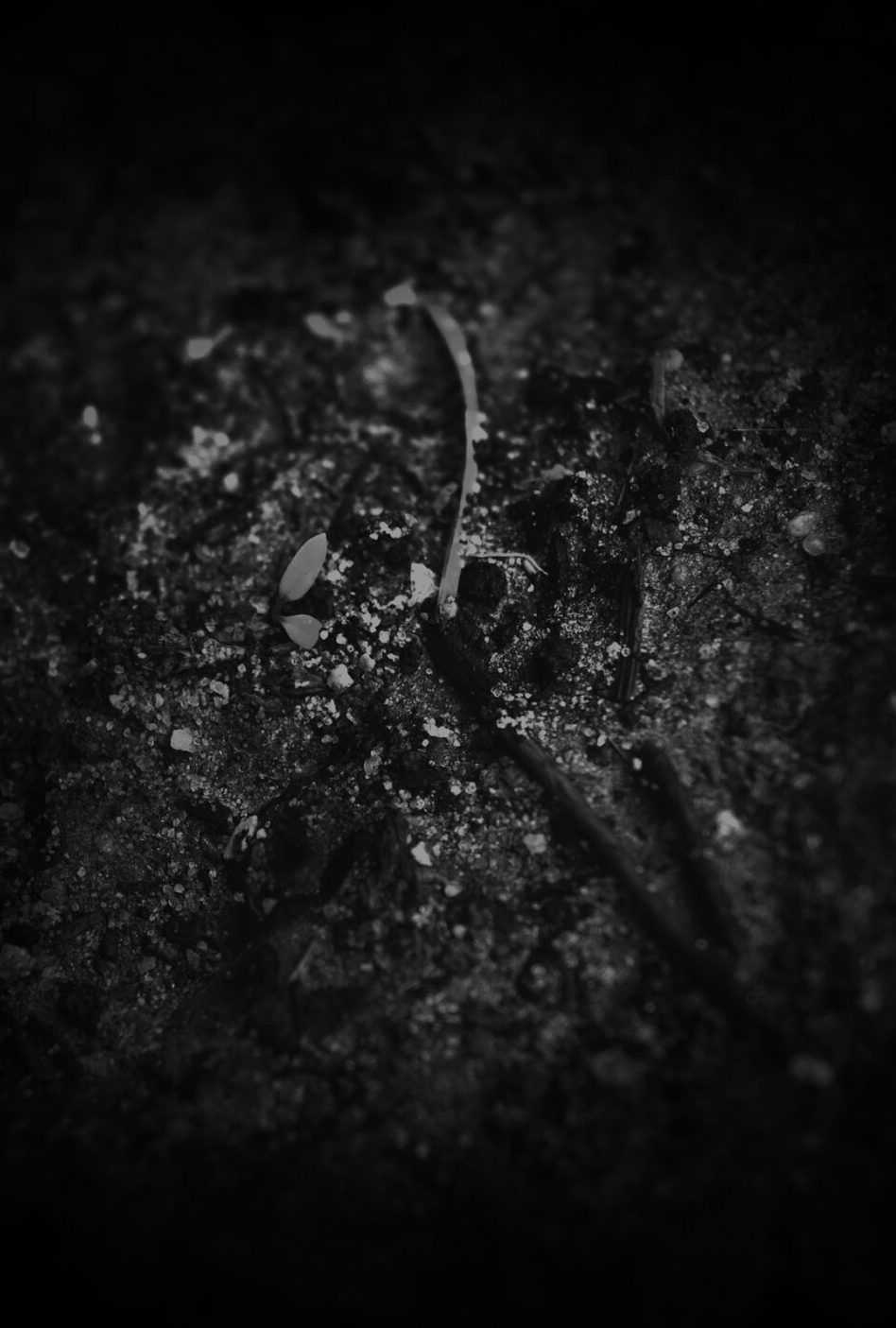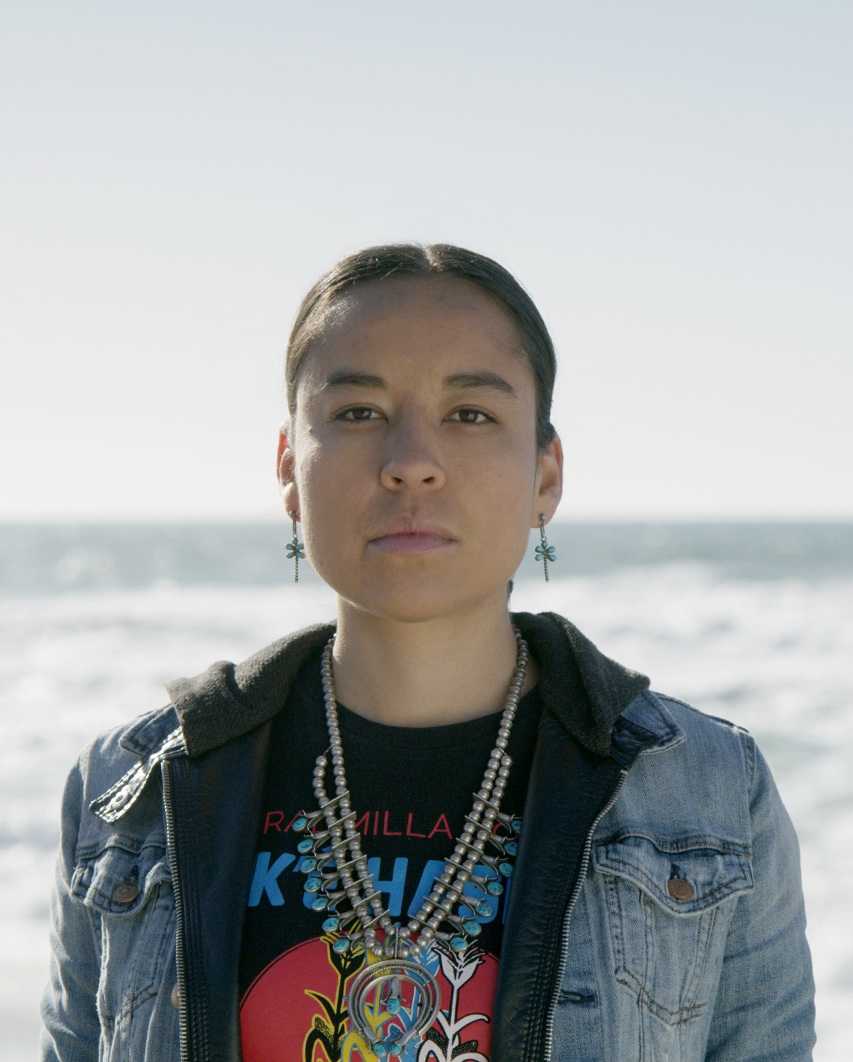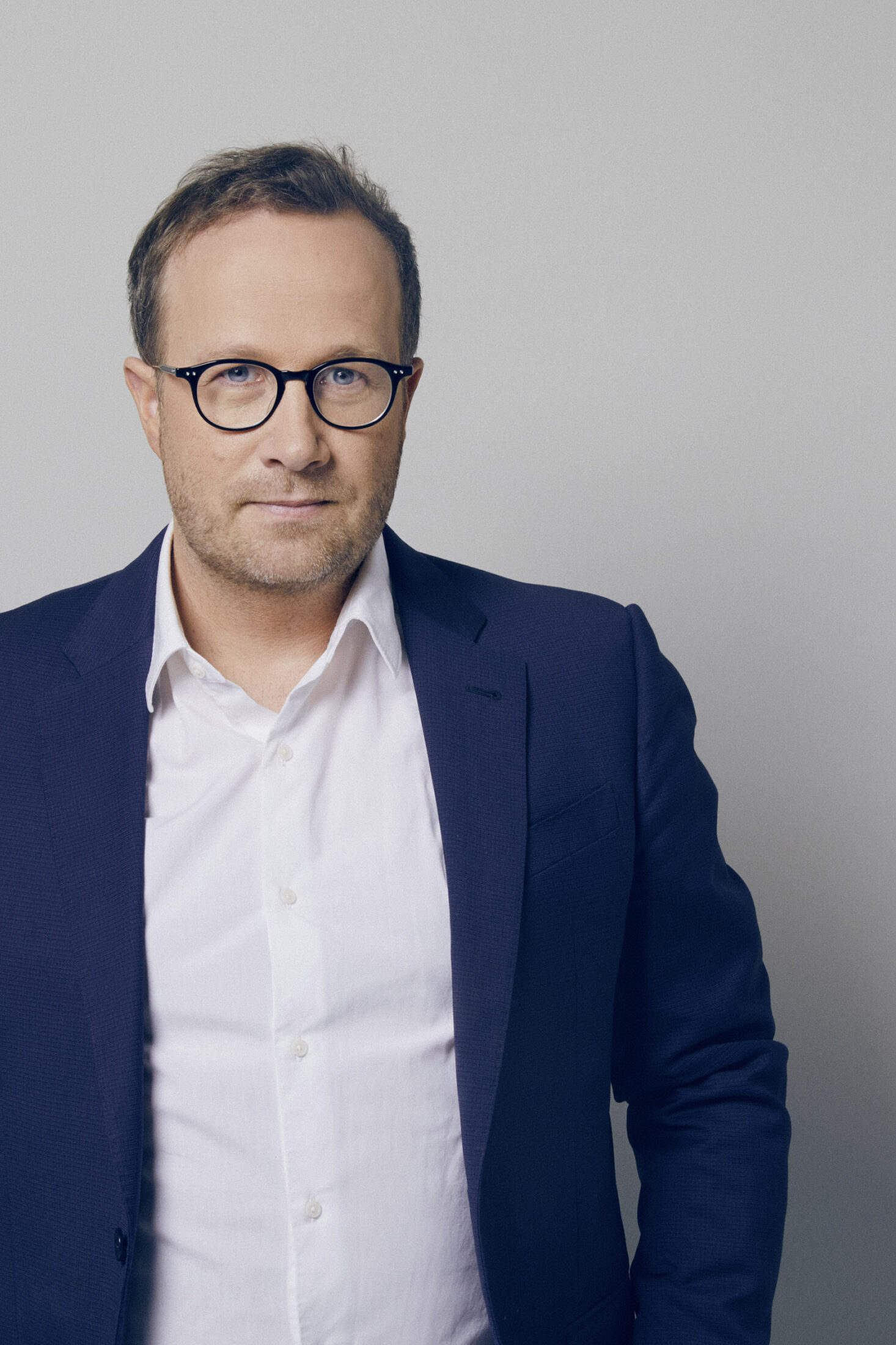
On Time and Water
Emmanuel Vaughan-Lee is an author, Emmy- and Peabody Award–nominated filmmaker, and a Sufi teacher. He has directed more than twenty documentary films, including Taste of the Land, The Last Ice Age, Aloha Āina, The Nightingale’s Song, Earthrise, Sanctuaries of Silence, and Elemental, among others. His films have been screened at New York Film Festival, Tribeca Film Festival, SXSW, and Hot Docs, exhibited at the Smithsonian Museum and London’s Barbican, and featured on PBS POV, National Geographic, The New Yorker, and The New York Times Op-Docs. His first book, Remembering Earth: A Spiritual Ecology, is forthcoming from Shambhala in summer 2026. He is the founder, podcast host, and executive editor of Emergence Magazine.
Andri Snær Magnason is an Icelandic writer and filmmaker. His latest book, On Time and Water, has been published in thirty languages, and his work has been published or performed in more than forty countries. His numerous awards include the Green Earth Book Awards Honor Book and a Phillip K. Dick Special Citation for his sci-fi novel LoveStar. His feature-length films include Dreamland and The Hero’s Journey to the Third Pole.
Andri Snær Magnason is an Icelandic writer and documentary filmmaker. In this interview, Andri discusses his new book On Time and Water and our relationship to time in an age of ecological crisis. With Iceland having recently lost its first large glacier, the Ok glacier, Andri discusses the ways in which geological time is beginning to move at the speed of human time. In order to bring about a planetary paradigm shift, he says, we need new ways to see and imagine ourselves into the future.
Transcript
Emergence MagazineAndri, you’ve had quite a varied career as a writer, an environmental activist, and even running for president of Iceland. And your work as a writer is just as varied, from poetry and children’s books to science fiction and nonfiction. Yet, running through all of your work is the desire to take on big issues, consumerism, the hubris of technology, climate change, and recently, you’ve been writing about time, both in The Casket of Time and now in your most recent book, On Time and Water. The books are really very different, The Casket of Time being a fantastical young adult novel and On Time and Water being a work of nonfiction that’s deeply personal and an exploration of the environmental crisis. And yet, time connects them—and not just in their titles. What is it that has drawn you to write about time? Why is it so important to you?
Andri MagnasonThe Casket of Time and On Time and Water, they are kind of siblings, creative siblings. They both come out of experiencing time and nature, having left geological speed and starting to change in human speed. But our reactions to this environmental crisis are on a geological level, contrary to what we have been doing in technology and progress and change during the twentieth century, how we have scaled up all sorts of industries. We have known about this crisis for forty years, but still we have not scaled up the solutions on the level that we have seen when other motivations are driving us. So both of these books are kind of exploring from the same root, the essence of time, or connection to time.
In my new book, On Time and Water, the idea is that, when you talk about the future, it becomes vague because, of course, the future doesn’t have anything. The future doesn’t have smell, texture, emotions. Like when you hear a word like “ocean acidification,” it’s not connected to anything. It has no cultural significance. It’s just “ocean acid-i-fi-ca-tion.” What is that? It’s not connected to the Beatles. It’s not connected to any president. It’s not connected to any experience that we have. It’s not connected to Hitler. It’s not connected to the Second World War. It’s the biggest word in the world, because it’s about the biggest change that has happened chemically to the planet for the last fifty million years. It should be so loaded that we should cry when we hear it, because it should almost be a taboo to say it, if you don’t want to spoil the party.
It’s out there, but it doesn’t have any connections. So, to put some kind of substance into the word, I feel like I have to use it throughout the book and connect it to things—like words that we didn’t understand before, like how we didn’t understand freedom, or other words that came into the language in eighteen hundred something or nineteen hundred something—just to make us understand and think about the word and how we don’t understand it, instead of just saying it and acting like readers should understand it. To use the word, I have to explain first that we actually don’t understand it and how we don’t understand it, because you can’t just throw a word out like that and expect the reader to be shocked or something.
I can’t say, “Things are enormous in the twelfth degree.” I can’t scale up my language like you can do with numbers. The only way to scale up language is by using poetry, grandmother’s mythology, and all sorts of methods of storytelling that humans have used since stories were told for the first time. I’m taking lots of this environmental science, and instead of saying I’m writing about climate change, I say I’m writing about time and water. And then people say, “Wow, that’s interesting.” When I say I’m writing about climate change, they’re like, “Oh, one more book about climate change.”
EMRight, as you describe, you hear white noise when you hear the word “climate change.”
AMSo I say I’m writing about time and water, and people open their eyes and ears and say, “Wow, what do you mean?” And I say, “In the next one hundred years, all the elements of water on the planet are changing.” So the glaciers are going down. The sea level is going up. The pH, the ocean acid level, is reaching a level that we haven’t seen for fifty million years. This is happening in a single person’s lifetime. And then people seem to rethink and re-understand things. And I think much of the rhetoric about climate change has gone through the same channels in our minds for a long time, like polar bears. Instead of polar bears, I use my grandmother.
Also, I allow myself to go a bit close to the spiritual, without being New Age, just allowing myself to go into travel writing of people that went into places, and they felt some kind of holiness in these places. That would just be a very basic, romantic semi-Christian holiness, that they would find God in the Icelandic Highlands.
Not only God. There was a poet that was describing how his soul resonated with the silence-loaded space dimension of God, so he went overboard in his language when he was in the Icelandic Highlands. That same area was destroyed, and I had been writing about it in my book, Dreamland. He felt the space dimension of God in this area that is now behind a dam under the biggest reservoir in Iceland. When I was talking about that area and I said it was beautiful, which is a very simple word, people said I was just exaggerating, and I was just going overemotional. But the thing is, the combined rationality of humans—the rational approach to destroying those Highlands—is what is throwing the climate overboard.
EMThere were a few things that really struck me when I was reading some of the book and now, hearing you talking about some of those stories. One was when you describe the importance of your grandmother and sitting around the table with your grandmother, and your mother, and your daughter. Your grandmother is ninety-four years old, I think, and you use a kind of thought experiment to connect your grandmother all the way up to your daughter’s daughter, spanning something like 260 years.
AMThe idea is that my grandmother was born in 1924, so she’s ninety-five now. Of course, I’m extremely lucky to have a cool grandmother that you can talk to and who remembers everything. I actually have a grandfather that’s ninety-eight, so longevity is good in my family. So, she was born in 1924, and we had this thought experiment at the table where I asked my daughter to calculate when she will become ninety-four.
She does that experiment, and she finds out that that’s in 2102. That’s mind-blowing because she hadn’t calculated that before, and she was like, “Wow! I’ll be like her in 2102?” And I said, “Yes. Maybe you’ll live in the same house, and maybe you will have a ten-year-old grandchild here. And you will talk to her about your personal experience with somebody that was born in the year 1924. And if your grandchild becomes ninety, what year is that?”
She does the calculation, and she comes out with the year 2170-something. “Imagine,” I told my daughter, “you will know somebody that is still alive in the year 2170-something, and not vaguely. This will be a child you will have known for maybe ten or fifteen years.”
The time that you connect with, personally—that you can touch with your bare hands—is almost 250 years. My daughter can touch 1924 with her bare hands and 2170. That’s almost 250 years. That’s the arm’s length. That’s the personal connection to people, the intimate time of my daughter.
What I’m trying to do in my book is update our sense of time—which is, of course, a very ambitious project—to connect us deeply to dates like 2150 as intimate time and to create just in a short chapter some kind of pancake sci-fi. Sci-fi tends to make us feel like the future is all about technology. The future is all about gadgets or flying cars or AI or whatever. While I think the primal goal of humans is to continue to be human and even more human—not less human—at least to be as human as my grandmother. I would think that I want my daughter to be as human as my grandmother, and I would think that she would expect her grandchild to be as human as she knew her grandmother to be. So that’s pancake sci-fi. The basis is we just want to be able to sit in a kitchen and eat pancakes with a grandmother, and just exchange stories and life experiences and things. So that’s why I wrote a chapter in my book that is sci-fi, but it’s pancake sci-fi.
There are no gadgets. There’s nothing. It’s just about at what time are you a human with another human? The sci-fi part—the sci-fi element, the gadgets—it tends to alienate us from the core of the future. You read a sci-fi book, and people are kind of semi-human because all your focus is on the transportation and the surroundings. So, I wanted to bring that into my story, which is quite contrary to what I was doing in Love Star.
EMRight, which is all about technology going haywire.
AMI’m going very anti-Love Star in this book, taking away all technology and just meditating on when is someone still alive that you will love? That is what the future is about.
EMRight, because in some ways, one of the major flaws of our civilization is its inability to see itself into the future. And yet, there are examples of cultures, native cultures, that imagine something seven generations into the future. The choice you make today has to impact seven generations, whether that’s positive or negative. The knowledge is out there, but it’s definitely not part of mainstream decision-making in relation to responding to climate change.
AMLike you have in the US, four-year decision making, or not even that, because they’re almost always running for president.
EMShort-term thinking.
AMVery short-term thinking. So you can’t make any major decisions in the last term, but then when the new government comes, it’s basically unwinding what the former government did. It’s like this forward and reverse, and there’s little progress that you see. The ability to plan thirty, forty, fifty, one hundred years in the future, which is cathedral thinking, when one generation starts half of a cathedral, expecting the next generations to finish it in the next 300 years. That is something that we seem to lack very much.
EMYou talked about how we’re moving in a different speed of time now, how geological time has started moving at the speed of human time, which is quite a profound shift. I don’t think it’s talked about very often. Why do you think it’s so hard for people to kind of take that on?
AMWhen humans, during the hundred years of the twentieth century, went from one to seven billion, of course, that is some kind of an explosion. We have experienced so much dramatic shift in our environment, which is basically our built environment, our cities. Just imagine what my grandparents have lived. I actually asked my grandparents, “Is one hundred years a long time or a short time?” They both said a short time, because they’ve experienced it in their own bodies.
Then I asked my grandfather, “When do you feel the world changed the most?” And he said, “During the last ten years.” And that is actually statistically true. The world changed the most during the last ten years, that is, or since 2000. I think half of the carbon dioxide that has been pumped out happened in the last twenty years. Half of the plastic produced on the planet has been produced since 2000.
This is happening kind of culturally, and in industry, but I think what we find difficult to compare is, there is a difference in the cultural, built environment—for instance, a city that changes a lot, or a country that changes a lot, goes from underdeveloped to modern. That happens during a lifetime, and we adapt well to that. People are kind of used to that. But when the oceans change from 8.1 pH level to 7.7, that is a completely different phenomenon. That is so large and should be so alarming that we should pull the hand brake on so many things that we are doing today, but it seems like we don’t manage to.
And that’s why when I have lectures for college students, I ask them to do this calculation: “When is someone still alive that you will love?” And they bring out their numbers, 2160. Then I ask them, “OK, here’s a graph of the scientists saying what’s happening in 2090. Do you now feel it’s beyond your imagination, or is it only halfway, in your concept of your continuity?”
So that is the kind of rhetorical propaganda, the metaphor that I’m trying to create in On Time and Water, is this arc. If you have meditated that 2160 is your intimate time, then 2090 is too close for comfort, instead of being just a fuzzy date far out into the future.
EMIt also seems like—and you write about this—one of the problems of people disconnecting to what’s happening in the future, even disconnecting to what’s happening around them, is the way that we describe it and the language that we use. And you talk about the importance of mythological language, which is not something that’s usually brought up in scientific circles to describe what’s happening, but if you talk about moving from geological timescale to human timescale, those are kind of mythical transformations, to have glaciers melt, oceans become acidic, the air become filled with carbon dioxide and start heating up. Those are kind of mythical stories if they’re all happening in the space of twenty, thirty, or forty years.
AMIf all this is happening in a hundred years, that is biblical. Those are biblical times. Such big changes are—that is the time of mythology. The world was created in seven days. Or the ocean changing in one hundred years. That is closer in time than fifty million years. Seven days against one hundred years. Those timescales are closer than one hundred years against fifty million years.
This is actually a creative story, or apocalyptic. That is, if it can be experienced in a single lifetime by a single human being that can tell it from beginning to end, that is mythological. Mythology is all about big ideas, big elements, and the main forces, the god of thunder and love, and the beginning and the end of the world. It’s all compact, maybe just in a few verses, and it becomes this kind of eternal source of inspiration. And that’s actually how my first children’s book, The Story of The Blue Planet, came about. I was thinking that mythology was all written before we knew we were living on a planet, and I wanted to create modern mythology about what it means to live on a planet.
At the same time, I was interviewing my grandfather, because he was a surgeon in New York. He’s ninety-eight now, and he operated on Oppenheimer, the father of the nuclear bomb. I lived this terror of the bomb in my childhood. I couldn’t believe that they would not press the button in the next ten years. I thought that would probably happen. I was also kind of starstruck that he had actually met the person that changed the laws, basically the fundaments of nature, or the elements.
Prometheus, he went to the highest mountain and came down with fire and gave it to humans and empowered us. But Oppenheimer went into the smallest material, came out with something bigger than a volcano, and made fire gods out of the world leaders. The ability that Genghis Khan or Hitler or Napoleon had, nobody had this button they could push to destroy the planet. But then I thought, of course, through my childhood, that Oppenheimer would be our destruction, that his creation, his button, would be the end of the world.
Now we know that it wasn’t Oppenheimer; it was Prometheus, because it’s the fires. It’s the fire that is causing global warming, all this oil that we’re burning, and we have hidden the fires so we don’t see any fire on a daily basis. We don’t see the fire culture that we are, how everything is burning—in our cars, the fire in our cars, the fire in our planes, the fire behind everything. So I calculated, how much fire have we created? And that is actually mythological, and the gods were right when they punished Prometheus, because they knew that we could not handle the fire. Remember the volcanic eruption in Iceland, in 2010?
EMThe one that grounded all the flights?
AMYes, the one that grounded all the flights. That was actually the first environmentally conscious eruption in world history, because while it grounded all the flights, it actually reduced emissions. The combined flights in Europe and North America would have been a greater fire than this volcanic eruption. This volcano emitted about 150,000 tons per day. The world emissions are about one hundred million tons per day. So if you translate what we pump out into the atmosphere on a daily basis, and translate that into these volcanoes, then it is like we have opened up 650 of these volcanoes, and not temporarily for two weeks like the one we had in Iceland, but every day, every moment, all year, for decades.
On a geological timescale, I cannot recall any period in the last millions of years where we had 650 volcanoes erupting for thirty or forty years. That has not happened. So when people try to deny that our emissions are having an impact, that is a very optimistic take on opening up 650 volcanoes. That is the power behind all our existence, and that is the task of the next thirty years, to put a lid on all these volcanoes, and that is a gargantuan task, actually.
EMYou seem quite optimistic that it’s possible for us to address this. You do question it in your book. Is it too late? Can it really be done? Have we opened the Pandora’s box too far?
AMYes, I could be very realistic and just say, “We’ve gone off the rails, and there’s no cruise control. We’re just going to slide into whatever happens.” But I don’t feel like I want to raise my children into that kind of mentality. And I do actually think that there are too many things that humans did accomplish during the twentieth century, to the good or the bad. There are many things that we have scaled up. There are many progresses in human rights and other things. I do believe that if you look at how we scaled up almost anything—flights, or the internet, or mobile phones, or infrastructures—that the combined human ingenuity, the combined talent, resources, and time exist to actually tackle this. The only problem is how stubborn our institutions are and how much time we waste on conflict, on arguing is this true or not?
Now the kids are in a climate strike, and it’s difficult to talk to kids about these issues, because I don’t want to have a lecture for kids and say, “I’m sorry. We blew it.” Because deep down, I don’t really believe that it has to be so. So I just tell them that the task is obvious, the task is this, and I show them the graph from the IPCC. We have to get emissions down to zero in the next thirty years.
It is technically possible. We know that. We can scale down all sorts of wasteful industries and scale up lots of renewable technologies. I tell them that when I was choosing my path, it didn’t feel like a purpose. We just got all this infrastructure, all the highways, the hospitals, everything, and our purpose was just studying something to place ourselves in a well-paying job somewhere to have a good life. Now you could say the paradigm has shifted. What needs to be done is obviously in front of us, and it’s not essentially negative to be a generation that has to rethink and reinvent and redesign almost everything.
When we went into design or something, it was more about, OK, here are one hundred million chairs. I’m going to make yet another chair, but it’s just going to be as meaningless as all the other chairs. But now, you could say, “OK, we have this process. It’s damaging, and we have to make it good.” It’s not essentially negative to be part of a generation that feels like everything they’re coming close to is making things better.
When somebody says, “Why am I studying algebra?” then the teacher has to say, well, this is the graph. We have to draw down 1,000 gigatons of carbon dioxide from the atmosphere in the next fifty years, and nobody has any idea how to do it. That’s why you have to study algebra. Also, people went to the moon forty years after they crossed the Atlantic, and they were doing this in the sixties, and they put enormous effort into that. Actually, scientists have pointed out that those moon landings and that space exploration was taking about 3 to 5 percent of the GDP of the US and has left us lots of useful inventions. A similar amount would actually be enough to come quite close to solving quite a lot of these problems.
EMBut a lot of those examples that you’re citing, they also work so successfully because they were done in conflict in some way. It’s like trying to beat the Russians. They had a common enemy, or enemy they could rally around, with the government saying, “We’re going to beat the Russians. We’re going to get in space. We’re going to get to the moon. We’re going to be the first to get there. Who’s going to be the first to fly across the Atlantic?” It’s competitive, and people talk about a World War II style mobilization of Manhattan projects on a global scale, but those were all done against an enemy. How do you have the kind of mobilization or changes you’re talking about, that people are talking about, without a common enemy?
AMThere is a common enemy.
EMOurselves? Yes, but that makes it harder because we’re all complicit.
AMAnd also, it’s a race where either everyone wins or everyone loses. This is actually a very interesting paradigm shift, planetary paradigm shift, because I don’t think we’ve ever had this common threat. This is kind of a comet that is approaching us, so this question is—
EMThe comet would be easier because we could see it coming towards us.
AMMaybe we just have to make some metaphor out of it, but the thing is that it also includes questions about patents. If somebody finds the patent to solve a very big problem, will that be shared across borders? Will that be shared to African nations? We already see it with AIDS. We have solved AIDS to some extent. Still it’s kind of being kept patented instead of being distributed, like penicillin, throughout Africa where people are still dying from it, like people have been doing for the last twenty years. The solution is already here, but it’s not distributed because somebody has the patent for it.
This will put lots of strains on people’s ideologies. What’s the role of the government? How do you make these incentives? Who’s going to pay for these things? But of course, like the race to the moon, who benefited from that other than just getting the prize for being first? It’s not like you found something, other than seeing the planet from space, like in your film.
EMWell, one of the things that I question often is when people talk about transitioning to a clean, green economy. For instance, you’ve got the Green New Deal in the United States and transitioning to a waste-free economy. All the solutions are there, as you said, there are so many solutions to so many of the problems we’re facing. But where I get hung up sometimes is, are we approaching it with the same model that got us here in the first place? So yes, we could all have electric cars and clean-burning stoves and all these technologies that would prevent us from emitting carbon dioxide, but we’re still a consumer-based society.
When I read Love Star, one of the things that struck me so much was these inventions that he comes up with, first understanding the way the birds communicate, and that’s a way that humans can communicate. It’s an incredible discovery, but then it’s used in a commercial purpose. Then there’s the discovery of that we have soulmates out there, and then that’s used for commercial purpose. Then death is used for a commercial purpose. Then the search for God is used for commercial purpose. So each one of these discoveries can then get co-opted.
I’ve been trying to draw a parallel between what you’re exploring there in Love Star and this kind of hubris of technology that we now see on a global scale when we say, we haven’t invented the technology to suck the carbon dioxide out the atmosphere, but we will be able to do it. And yet we don’t talk about the deeper questions that you’re also talking about in your book, which is thinking about our relationship to time, generationally, and making changes based on what you can hold in your hand and what you can love.
AMI’ve kind of been conflicted with that as well, because there’s also this idea that we could connect it back to nature again on some kind of a deeper level, but in some way, we have been launched off. We have detached.
EMFrom nature?
AMYes. So we found these oil wells and these million years of summer that were lying there underground. We bypassed nature, and we created six billion human beings out of this energy. The superpowers that this oil has given us—the oil, gas, coal—we have become blind to the superpowers and how our social fabric is totally based on these superpowers that we have. If we remove these superpowers, then there’s so much that has been placed wrongly according to what we can do with manual labor.
How long would it take for me to take my family on a road trip around Iceland if I had to drag the vehicle? We just take it for granted that we’re five hours, taking a two-ton vehicle with all the kids and everything, across the country. And then taking for granted all the food that we can harvest from sending ten people in a trawler, coming back with 1,000 tons of fish or something. We are kind of addicted to these superpowers that energy and technology have given us. If that was taken away in a disruptive way, then we could also have social disruptions.
EMWell, we’re seeing that already.
AMThat could create chaos and possible consequences that would be equally bad as the worst effects of climate change. We saw Europe burn twice during the twentieth century. Ideology, inequality, and just disruption in itself can cause a war and can cause something like what happened in Syria. Even though, basically, you could have all the resources and technology to live in a good society. What I’m trying to imagine is, is there a way to jump from this oil-driven existence into another existence? I actually don’t really know if it’s possible.
EMThere’s a kind of a mythological question.
AMBecause I think we will need these superpowers still, that is we will need energy and this advantage that technology has given to us, because some people say that this can’t be solved with technology, or technology was what put us into this place in the first place, and we can’t rely on that.
But I still don’t think that we can take 1,000 gigatons out of the atmosphere. We can do it with trees to some extent. But I do think that technology has to solve it, because I just think we’ve gone beyond what nature can actually repair, itself. We put it out with technology, and I think we will have to take it down again—to some extent, it could be 50 percent or something—with technology.
We’ve seen that here in Iceland, where they have these first plants of carbon captures that are turning that into stone. That industry, whether you like it or not, has to become like 50 gigatons, or even 1,000 gigatons. So, what I’m trying to understand is that, even though maybe I don’t like how we got here, we’re still stuck with all sorts of expertise and engineering and infrastructures and things that also have the key to solving the problem.
EMRight, but going back to the analogy to the World War II mobilization, which was so successful—in that case, they weren’t focused on keeping the US or global economy running. They were focused on beating the Japanese and the Germans, right? Everything went towards that goal. If you’re trying to transition a global economy, or you’re not really even trying to transition it, you’re trying to hold on to it in one hand. Some people are trying to transition it, and then you’re going to say, “But at the same time we’re also going to invent new technologies or apply new technologies in solving this.” There’s no focus. You could say, the smart thing to do would be to say, “OK, all effort will be on just trying to address the crisis. We aren’t going to think about the economy. We can’t even think about the economy. We will deal with that when we’re there in fifty years.” People would never accept something as dramatic as that.
AMWe shouldn’t think of this as ending capitalism and starting some kind of a socialist, clean utopia, because ideologies are always failing, and corruption and all sorts of problems are failing us. But I do think that this special problem that we have will need some different type of governance, and probably this capitalist era that we’ve gone through in the last thirty years is not the—
EMModel that we need.
AMIt’s not the model that will solve this. And also how we divide into borders, and also how we keep technologies closed to others. I wrote about this dilemma in my book, Dreamland.
EMWhich was also about the economic crisis here in Iceland?
AMIt was before the crash, actually. We were building a dam in Iceland, and I was trying to explain that it wasn’t about “to have built a dam.” It was about “to be building dams.” We had a big lobby of engineers, and they did not want to “have built a dam.” They always wanted “to be building a dam.”
EMSo whatever was built once would then be replicated.
AMYeah, and after they had built a dam, they would be even better at building dams, so they were even more eager.
EMAnd dam all the rivers in Iceland.
AMThat’s actually what they did plan, so that was what my book was about. The engineers had the vision of damming every single river in Iceland and selling that to aluminum companies. I thought that was a totally dystopian view, and I didn’t understand how you could go through engineering training, and live in this society with these beautiful landscapes, and have this dream of destroying it all and selling it to aluminum companies. Of course, the economic side of it was not essential good: a monoculture of an island with five big aluminum companies is not essentially a good economy. I was trying to understand this situation where we are immensely creative—an engineer that can build a dam in the Highlands and tunnels eighty kilometers long is a very creative person that has lots of talent. But how can he be so stuck on this single, narrow path, that he will be fierce as a lion if you try to step in his path and he can’t build the next dam? So he had a really fierce lobby working to undermine environmental laws, environmental rules, environmentalists, and natural scientists that were standing in the way of building the next dam. These were really militant, arrogant, strong lobbies that we had, especially around 2000 to 2006. We have managed to—with lots of mobilization—change that path.
I was trying to tell a story to explain this. Why did they want to build another dam, even though it didn’t make any economic sense? I was wondering about the pyramids in Egypt. Why are these pyramids three? What is that? Why do they have these three giant pyramids? And I didn’t know very much about it, but as I made this thought experiment: I would bet that they were not built like one pyramid, and then 500 years later, another pyramid. I bet it was just one crazy period when they made these three pyramids, because it’s not possible to build one pyramid. If you’re going to build one pyramid and have 40,000 people build a pyramid for forty years, you don’t stop doing that. You don’t just say, “Thank you, you can go home now,” because if you are building a pyramid with 40,000 people, for forty years, that’s what your economy is about. It’s about building pyramids.
You have, suddenly, generations, because people lived a shorter life then. So suddenly you have two or three generations that don’t remember anything other than working on this pyramid, and the whole supply chain of your country is about making the ropes, cutting the stones—the whole hierarchy of the society is about where you are in building the pyramid, from the chief architect, to the lowest slave, to the people supplying this structure. If you stop building a pyramid, you have chaos. If you just say, “Go home now.” You don’t tell people just to go home and do something, because they have been used to having an assigned job for forty years. They’ll ask, “What do I do now?” Naturally, they start building another pyramid, because that’s the only way to keep the society and the structure whole, and after eighty years, nobody even has the idea that there should not be another pyramid. It’s just a question of how much bigger the pyramid should be, so it’s not until they have built the third pyramid that some people start scratching their heads, like OK, so we’re going to build a fourth? A fifth? Can this go on like this?
And they hear rumors from Greece where not everyone is a slave, just every other person is a slave. And they have these amphitheaters, and they watch tragedies, so they get this news about alternative ways of life. Then I looked into the archaeology research, and it was actually true. The pyramids, the Great Giza Pyramids, were built in a crazy span of 120 years, and I think that now, with the children’s strikes, that we finally have a generation that is seriously questioning—
EMThey don’t want to build pyramids anymore.
AMThey don’t want to build pyramids anymore, and they don’t see the sense of it, and they don’t understand, why am I toiling my whole life, dragging myself to some job, just to have this metal case around me that we call cars? Why are we putting all these resources into these roads, and highways, and these ramps, and all this? They’re questioning everything, the foundations of what we are doing and why we’re doing it, because they see the damage of it, so I think that this generation that is now climate striking will bring the change on a much faster level than we’ve seen before, that is, change in how we eat and how we dress. Their dreams will be different from the dreams that we had, because their dreams are against a real threat. You were asking, “What is the threat?” We had Hitler. We had the competition of the moon landing. These kids, they feel the threat. You don’t have to tell them that there’s a race to something.
EMWhat’s interesting, at least from my perspective, when I hear Greta or other representatives of this movement, or just the kids who are part of it, nine-year-olds, fifteen-year-olds, they’re not talking necessarily about how we need to transition to a green economy. They’re talking about how we need to have a future, which in some ways is a much better message, because it’s not trying to say we need to transition from building pyramids made of fire to pyramids made of lithium ion batteries. They’re saying we want a future, and we need you to wake up to the reality of what’s happening. It’s a very simple message read over and over again, and if you’ve read Greta’s speeches, they are very similar, all of them, the same message. That’s what’s resonating; it’s just a simple reminder of the truth of what’s happening.
AMShe’s astonishingly direct, actually, and everything is based on science, and it’s just straight to our conscience. It’s amazing how middle-aged men are furious over this child. How dare she? How dare she say this? We’ve seen how feminism has changed the language. I think that actually paved the way for Greta, that we’ve removed lots of obstacles that were used before against a child like this, or a girl that would speak, and prejudice against autism or youth, or a female. These obstacles were cleared in the last ten years, and that made it impossible to brush her off without being obscene, so her verse just rises, and the old bully that would have taken her down doesn’t have the social permit anymore to do it. I think that these kids will question lots of things in a similar way over habits and make lots of things that we are doing now socially unacceptable. That’s how the change will happen much sooner than we might have expected.
EMIt seems like the ideology that they are suggesting we embrace is an Earth-based ideology.
AMYeah, if you want to be really optimistic, then you see how these kids are unified. It’s still a very unified movement. You see the climate strikes in Uganda. You see it in Kenya. You see it in Latin America, India, Sweden, North America, 500,000 kids in Quebec. This should be a big source of optimism, that the paradigm shift is actually really happening. Maybe I’m just in some kind of wishful thinking or something, but at least for the next twenty years, I want to believe this. I might go into cynicism somewhere in my sixties, but still, I want to believe that this is a generation that will take this very seriously.
EMWell, here in Iceland you had the experience, earlier in this year, of actually witnessing very intimately the results of what happens when you have this fire-driven beast of the global economy, the coal and oil and gas that’s been unleashed into the atmosphere, and how it affects the glaciers here in Iceland. And you recently lost the first large glacier in Iceland, the Ok glacier.
AMYes, a commonly known glacier in Iceland, which was the Ok glacier, and so the first victim of Prometheus, the curse of Prometheus on a glacial level. I got the strange role, or assignment, to write a eulogy to the glacier and write some words for the plaque that was to be put in memory of this glacier. I scratched my head quite a lot this summer when I was writing this, because actually, in the next hundred years, we’re going to lose even more important glaciers than this one, culturally significant ones like Snæfellsjökull, which is where Jules Verne went into the center of Earth. Spiritual people believe it’s one of the Earth’s energy centers, or you could say New Age people, and in literature it’s one of the culturally most important places we have in Iceland. I wrote these words, and we put the plaque there in August, and at first, I thought I was writing a text. I was thinking, OK, I’m writing a text for this single, lonely traveler that stumbles upon this plaque every other year. I thought, actually, I was writing a text for very few people, but then that blew up, and the event became quite global, so it’s probably the text that has been read the most out of what I’ve written until now. I can read it for you.
EMThat would be great. Thank you.
AM“Ok is the first glacier to lose its status as a glacier. In the next 200 years, all our glaciers are expected to follow the same path. This monument is to acknowledge that we know what is happening and what needs to be done. Only you know if we did it. August 2019, 415 ppm CO2.”
EMI read an op-ed of yours in The Guardian, I think it was, and you talked about the process of writing this memorial, and you wrote, “How do you write a eulogy for a glacier? Think about it. How would you go about that? Having grown up with glaciers as a geological given, a symbol of eternity, how do you say goodbye?” These are very potent questions.
AMMy grandparents, they were part of the Icelandic Glacial Research Society, so the nostalgia of glaciers was very strong in my family. There’s a peak on Vatnajökull, which is Europe’s biggest glacier, that is named after my grandmother, so that’s only in the fifties that these places were discovered. At that time, the glaciers were eternal, that is, they were something that was there, and they were doing research basically for science itself and to understand the glaciers. If you imagine that, you have 1,000 meters, or 3,000 feet, of ice under your feet if you’re on the central cap of that glacier. It’s like three Empire State Buildings stacked up on each other, and you stretch that out to the horizon. The mass is so immense, and to imagine something like this to be actually fragile is actually mythological again.
It’s very difficult to get your mind around it. In my lifetime, if I become a cool hundred-year-old, I could probably write ten of these, twenty of these, just in Iceland, and I could write the eulogy to some very culturally significant glaciers, and geologically significant as well. Again, that is not something that one single human being should experience. Yes, we can experience a city expanding, a civilization growing. I could live the rise or the fall of a Roman Empire or something, but to live the fundaments of the planet—that is, the pH of the oceans, the glaciers of a planet, the atmosphere’s heat— that is not something that you should experience in a lifetime.
